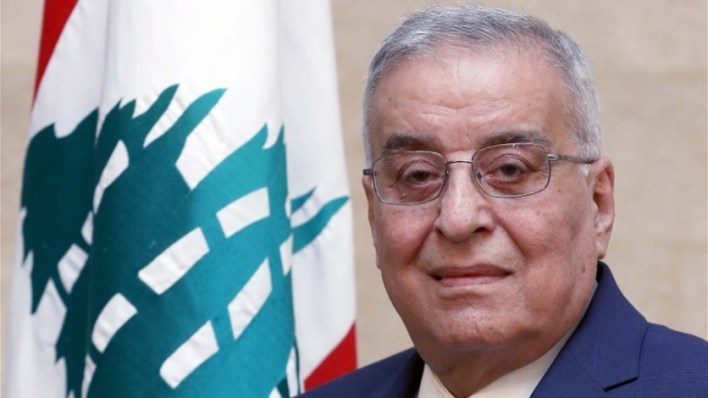The Lebanese and Qatari officials discussed the recent regional dispute.
Lebanon’s Foreign Minister Abdallah bou Habib held a phone call with his Qatari counterpart, Sheikh Mohammed Bin Abdulrahman Al Thani to discuss an unravelling diplomatic crisis with GCC states, an official source stated.
During the call, the Lebanese minister thanked Doha for its efforts in “containing and mitigating the severity of the crisis,” the Lebanese Ministry of Foreign Affairs said on Sunday.
١)أجرى وزير الخارجية والمغتربين عبدالله بو حبيب اتصالا هاتفياً منذ قليل بنظيره القطري الشيخ محمد بن عبد الرحمن آل ثاني مرحبا" وشاكراً كافة الجهود المبذولة لاحتواء التصعيد والتخفيف من حدة الازمة الراهنة، ومشدداً على أهمية التواصل والتلاقي مع كافة الأشقاء الخليجيين والعرب
— Mofa Lebanon (@Mofalebanon) October 31, 2021
Bou Habib stressed the need to communicate and meet with all “brotherly” Arab and Gulf countries to de-escalate tensions that have flared over the past week.
“Lebanon is keen on taking all necessary measures to overcome this crisis and restore friendly ties that serve the best interest of our Arab nation and people,” the Lebanese official said.
Tensions ignited last week after comments made by now Minister of Information George Kordahi resurfaced online. Ahead of his appointment as a government official, Kordahi criticised the Saudi-led coalition’s military intervention in Yemen, describing the war as “futile” and saying it is “about time for it to end.”
He added that Yemen’s Houthi rebels, who overran the capital and pushed out the internationally-recognised government in 2014, were “defending themselves… against external aggression.”
Kordahi added that “homes, villages, funerals and weddings were being bombed” by the Saudi-led coalition.
Despite sharing his opinions as a civilian at the time, the now-resurfaced remarks have triggered fury across the Gulf Cooperation Council that has quickly transformed into a diplomatic rift between the bloc and Beirut.
Saudi Arabia along with Bahrain, the United Arab Emirates, and Kuwait took joint action in expelling their Lebanon envoys and withdrawing their ambassadors from Beirut.
Riyadh has even imposed a ban on trade with Lebanon, while the UAE banned its citizens from traveling to the country.
Speaking to Al Jazeera, Bou Habib confirmed other world powers have stood behind the new Lebanese government.
“We do not understand the harshness of the Saudi side and issues between any two countries should be resolved through dialogue,” the minister said in a statement on the Al Jadeed programme on Sunday.
“The government is staying, and according to what I have heard from Aoun and Mikati, there is an international reassurance supporting the new government,” he added.
Read also: Crisis-stricken Lebanon faces GCC fury over Yemen war criticism
In a previous statement, the Lebanese ministry also thanked Oman for its position on the crisis. Unlike its GCC neighbours, the Oman Foreign Ministry called for de-escalation and resorting to dialogue to address differences, without imposing any punitive measures on Beirut.
On Sunday, US Secretary of State Anthony Blinken said on Twitter that he discussed with his Saudi counterpart Faisal bin Farhan “the situation in Lebanon.”
Spoke today with Saudi Foreign Minister @FaisalbinFarhan about the situation in Lebanon as well as the need to immediately restore the civilian-led transitional government in Sudan. pic.twitter.com/uUAys1D9V2
— Secretary Antony Blinken (@SecBlinken) October 31, 2021
Earlier reports suggested the Lebanese government has not officially asked Kordahi to submit his resignation. However, in a tweet posted on Twitter, Sleiman Tony Frangieh, the current leader of the Marada Movement, said Kordahi had offered his resignation.
“But I refused as he did nothing wrong,” Frangieh said.
This was later confirmed by Kordahi who said his resignation is “out of the question.”
The newly-appointed information minister also held a phone call on Sunday with PM Mikati assuring him that “I am not resigning and your government is not going to collapse.”
On Saturday, Doha’s foreign ministry said it “calls on the Lebanese government to urgently and decisively take the necessary measures in this regard to calm the situation and to quickly heal the rift between the brothers.”
However, Qatar dismissed Kordahi’s comments as “irresponsible” and accused him of plunging Lebanon into an “external crisis.”
On Saturday, Saudi prince Farhan told CNBC that Kordahi’s remarks “are a symptom of a reality – a reality that the political scene in Lebanon continues to be dominated by Hezbollah”.
“For us, it is broader than just the comments of one minister. It is more an indication of the state that Lebanon is in,” he said.
Addressing the Saudi foreign minister, Bou Habib said in an interview aired on Al Jadeed that “Hezbollah is an integral part of Lebanon but is not all of Lebanon and does not control the country.”
He stressed that “we will not allow any crisis to be resolved on the price of Saudi Arabia or Lebanon” noting “the Arab league should call for dialogue.”
The Lebanese official noted that “this government has been facing problems since its formation, si it is incapable of meeting to take an unanimous decision regarding minister Kordahi.”
Follow Doha News on Twitter, Instagram, Facebook and Youtube







